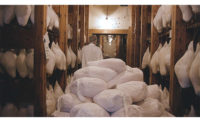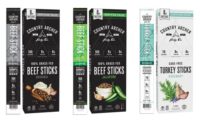Anyone who is a parent of school-age children knows that tuition is only part of the cost of education. Tuition doesn’t cover field trips, uniforms, instruments and, of course, school fundraisers. At least once or twice a year, children come home from school with an order form and a quota for products they have to sell. It could be wrapping paper, popcorn, candy bars or raffle tickets, but the result is the same: families and friends have to shell out money for overpriced stuff they don’t need.
Country Meats and the schools that have partnered with them offer an alternative: snack sticks. More affordable than catalog junk and healthier than cookies and candy, snack sticks make for an ideal fundraising tool. The schools and school groups that have partnered with the Ocala, Fla.-based processor have raised more than $24 million in profits since the company entered the snack stick market almost 30 years ago.
“That profit has gone for trips, instruments, uniforms, greenhouses, tractors — I’ve heard everything. Maybe the school was hit by a tornado or a hurricane, and they use the money to rebuild,” says Paul Geatches, president of the family-owned, family-run company. Geatches’ parents, wife and two brothers are both active in the business, meaning that six of the company’s 18 employees share the same last name.
The formula for fundraising success is rather simple. Country Meats sells its sticks to the school for 55 cents. The students sell them for $1 each, giving the school 45 percent profit for each stick sold. To date, Country Meat’s sticks have been sold in 11 percent of the schools in the country.
Geatches notes that for most extracurricular activities such as marching bands or field trips, the students raise some of the money, and the parents end up writing a check to cover the balance of the cost.
“It’s getting harder and harder for families to write those checks,” he points out, “so fundraising is becoming more and more important and critical for programs.
“The end result is it enhances the experience of the student during his school years,” Geatches says. “What we sell are sticks, but what they make are memories.”
Changing a philosophy
The name “Country Meats” reflects a time when the company’s business model was very different. The company was started in the Geatches family barn by Paul and his father, Jerry. They would travel throughout a three-county area in Florida to do all manner of custom butchering. While cows and pigs were the most common type of animals, Geatches recalls that they also processed reindeer, alligator, emus and ostriches, too.
“Our philosophy then was, ‘Don’t ever turn your back on any opportunity that comes through the door,’” he recalls. “The interesting thing was, when we flipped that philosophy 180 degrees, we became successful.”
One of the opportunities that came through the door ended up changing the business completely. A school approached the Geatches and asked if they could make some snack sticks for a fundraiser. They completed that project, and then realized there might be a number of other schools that might want the same product. That led to Country Meats becoming a full-time snack stick maker.
“When we entertained every idea that came through the door, our focus was scattered,” Geatches says. “We never had an opportunity to develop a formula that was repeatable.”
The point of no return came when the family decided to buy an automated wrapping machine instead of hand-wrapping the sticks. Country Meats did some custom butchering after the purchase to help pay off the expense, but the handwriting was on the wall for that aspect of the business. Geatches notes that if the company wanted to grow, it would do so as a snack stick maker. There were, after all, only so far that they could drive for custom butchering, but snack sticks could be sent anywhere.
To get its name out there, Country Meats began attending trade shows for fundraisers and sending out thousands of samples to educators. The company correctly thought that if its sticks were popular in schools in Florida, the formula would work in Georgia as well. The company kept expanding to the point that it now reaches all 50 states and attends 60 trade shows a year.
While Country Meats changed its philosophy in regards to its business, its dedication to quality never wavered. The quality of its product has helped win over consumers who would never otherwise try snack sticks, based on a preconceived notion of how they taste.
“With a product like ours, you either like the stuff or you don’t,” Geatches says, noting that cheaply made snacks can be greasy and leave a film in the consumer’s mouth. “All things aren’t created equal. We just took the high road of quality and freshness.”
Along with the thousands of samples Country Meats gives away at trade shows, it mails thousands more to teachers and principals across the country. Geatches believes that the company can get the sale if someone actually tries the product and experiences the quality first hand. The samples have paid off; in a category where the typical consumer is male, half of Country Meats’ sales go to women.
“We knew we had a good product, and if they’d taste it, they’d like it, and everybody wins,” he says. “It has zero trans fats, low calories, high protein — all these benefits packed into this snack that they didn’t think they’d like.”
Family dynamics
Jerry and Paul Geatches may have been the ones to start Country Meats, but as the company has grown, more of the family has come on board. Paul notes that each person has a unique set of abilities, so each person is able to contribute to the company’s overall success in a different way. Each of the brothers is six years apart in age, which helps to diffuse any competitiveness that might hurt the operations.
“Everybody respects each other and what they bring,” he says.
Geatches describes himself as a voracious reader who runs numbers and business projections for fun. He brings strategic thinking, trend analysis and marketing and organization ideas to the table. He also had the experience of working for Walt Disney Co. in nearby Orlando for three years, which he says gave him insight into how a world-class organization runs.
His father, on the other hand, is an entrepreneur. A tireless worker, Jerry Geatches won’t sit down to develop a business model to determine if a business will be successful. He will, however, work as hard and as long as it takes to make it successful.
“I think it takes somebody like that to start [a business] in a barn, because I couldn’t do it,” Paul says. “I’m more pragmatic.”
Paul’s younger brothers have entered the business as well and brought their skills with them. He describes Arron, the middle brother, as an extrovert and risk taker. His high energy and personality makes him the ideal person to represent Country Meats at trade shows across the country. Jeremy, the youngest brother, is a computer expert who handles IT duties for the company and also designs the company’s flyers and sales materials. Jean, Jerry’s wife and mother to the three boys, has natural people skills and can turn a customer into a friend over the course of a phone call. Paul’s wife, Patty, has experience as a manager for a large retail chain, overseeing more employees than Country Meats has now.
With the number of family members involved in the business, the issue of succession planning is an important one for Country Meats, Geatches notes. The brothers all have young children, and they envision the company being handed down to the third generation someday.
“The amount of effort and time we spend to research and talk about [succession planning], we feel, it almost as important as running the business itself,” he says. “If the train goes off the track with the passing of a torch, you’ve just ruined everything you’ve built.”
Country Meats built its current location in 2010, transitioning off the farm into a state-of-the-art facility. Geatches explains that the plant, just over 12,000 square feet in size, is located on two acres of land. It features the first smokehouse the company ever bought (Paul and Jerry built the previous smokers) and has space for a second smokehouse when the company decides to expand sometime within the next three to five years.
“That thought came from being on the farm for 20 years,” he says. “Every time we grew we had to knock down a wall or add on. We couldn’t respond to growth, we had to react, and there’s a big difference.”
Country Meats now has the capacity to produce 75,000 sticks a day, and the addition of a second smokehouse could double that production. At the farm, the company was maxed out at 18,000 sticks per day.
The facility, though it is nearly three years old, looks brand new, as does the equipment inside it. That attention to detail came from Paul Geatches’ Disney experience. At the theme parks, objects like benches are on a regular repainting schedule, whether they need it or not.
“That’s why the Magic Kingdom looks so fresh, and it’s over 40 years old,” he says.
Country Meats repaints its docks bright red every year to keep the outside looking nice. Any scuff marks or dings on the walls are quickly repainted as well. The company has also instilled in its employees the importance of maintaining the equipment. Country Meats has a new wrapping machine and will buy another in 2013, but its oldest working wrapper is about 25 years old.
“We’ve had people come and fix the equipment, and they think it’s been in a time capsule,” Geatches says. “In most places, the employees are in production mode, and they’re not thinking about dinging up the equipment, but we are.”
Thinking retail
Country Meats has grown every year for the last 15 years. Geatches attributes that growth to finding a formula that works and not chasing everything that comes through the door. While the company has the capacity to process hams or roast beef, those things just do not fit into the business model.
“The old philosophy of not saying no to anything has stopped,” Geatches says. “We realized you can’t do everything.”
The snack stick market has plenty of room for a small company to grow and expand. It would seem like a natural extension for Country Meats would be to enter into the retail marketplace. The company has tested retail/convenience store sales with its Gasparilla Gold brand of snack sticks, and it has been picked up by some national accounts. Unfortunately, Gasparilla Gold faces stiff competition in that marketplace from the largest snack stick makers in the country, which have strong name recognition and multi-million dollar advertising campaigns.
“What’s nice is that we sold enough to pay for the whole experiment, so I didn’t lose any money and got a free education. I learned how we will approach it the next time,” he says.
Geatches notes that the fundraising world is still large enough that Country Meats doesn’t have to enter into retail in order to keep growing.
“It’s not time for me to be in a 7-Eleven, but one day I will,” he says. “We are going to be in retail, and when we get there, we’ll have perfected a formula that we know works.”















Report Abusive Comment